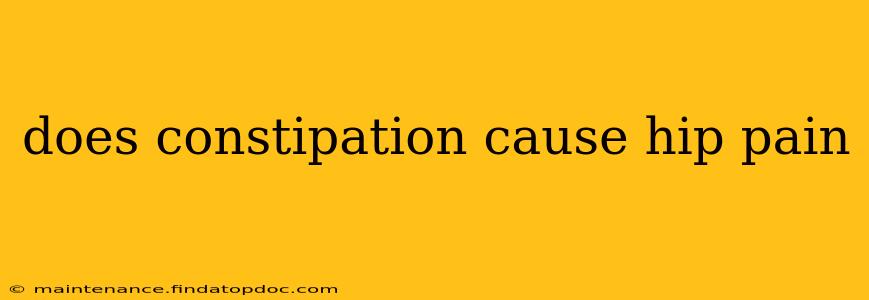Does Constipation Cause Hip Pain? Unpacking the Connection
Constipation, characterized by infrequent or difficult bowel movements, is a common ailment affecting many people. While not directly causing hip pain, constipation can indirectly contribute to discomfort in the hip region through several mechanisms. This article will explore the potential links between constipation and hip pain, addressing common questions and providing valuable insights.
How Can Constipation Lead to Hip Pain?
The connection between constipation and hip pain isn't straightforward; it's often indirect and involves several factors. The primary way constipation can cause or worsen hip pain is through increased pressure and strain on the pelvic floor muscles and surrounding structures.
-
Straining during bowel movements: When you strain to pass a hard stool, you're putting significant pressure on the pelvic floor muscles. These muscles are intricately connected to the hip joints and surrounding structures. Prolonged or excessive straining can lead to muscle spasms, inflammation, and even injury in the hip area, resulting in pain.
-
Pelvic floor muscle dysfunction: Chronic constipation can contribute to pelvic floor muscle dysfunction. This dysfunction can manifest as tightness, spasms, or weakness in the muscles, leading to referred pain in the hip region. The interconnected nature of these muscles means that problems in one area can easily radiate to others.
-
Increased abdominal pressure: A distended colon filled with impacted stool puts pressure on the surrounding organs and tissues, including those in the pelvic area and near the hip joint. This pressure can irritate nerves and cause referred pain.
-
Sacroiliac joint pain: The sacroiliac (SI) joint connects the sacrum (the triangular bone at the base of the spine) to the ilium (part of the hip bone). Chronic constipation and straining can put extra stress on this joint, leading to inflammation and pain radiating to the hip.
What are the Symptoms of Constipation-Related Hip Pain?
The hip pain associated with constipation might manifest in various ways:
-
A dull, aching pain: This is often the most common type of pain related to constipation. It might be localized to the hip itself or radiate down the leg.
-
Pain worsened by bowel movements: The pain might increase during or after straining to pass a stool.
-
Pain relieved by bowel movement: Once a bowel movement is successfully passed, the pain might subside, albeit temporarily.
-
Pain accompanied by other constipation symptoms: This includes infrequent bowel movements, hard stools, bloating, abdominal discomfort, and straining.
Can Constipation Cause Lower Back Pain as Well?
Yes, absolutely. Similar to hip pain, the increased pressure and strain associated with constipation can affect the lower back muscles and joints. The proximity of the colon to the lower spine means that a distended bowel can directly exert pressure on these structures, resulting in lower back pain or exacerbating existing conditions.
How is Constipation-Related Hip Pain Diagnosed?
Diagnosing constipation-related hip pain often involves a thorough physical examination and a review of your medical history and bowel habits. Your doctor will likely assess your abdominal and pelvic areas, focusing on muscle tone and tenderness. Imaging studies, such as X-rays or MRIs, might be ordered to rule out other causes of hip pain, such as arthritis, fractures, or other musculoskeletal conditions.
What Treatments are Available for Constipation-Related Hip Pain?
Treating constipation-related hip pain focuses on alleviating both the constipation and the pain itself. This often involves a multi-pronged approach:
-
Dietary changes: Increasing fiber intake through fruits, vegetables, and whole grains, and drinking plenty of water, are crucial for promoting regular bowel movements.
-
Laxatives: Over-the-counter stool softeners or bulk-forming laxatives can help alleviate constipation. However, it is essential to consult a doctor before using laxatives, especially long-term.
-
Exercise: Gentle exercise, such as walking or yoga, can help strengthen the abdominal and pelvic floor muscles and improve bowel function. Pelvic floor physiotherapy can also be beneficial.
-
Pain management: Over-the-counter pain relievers, such as ibuprofen or acetaminophen, can help manage the pain. In some cases, your doctor might prescribe stronger pain medications.
-
Physical therapy: A physical therapist can help identify and address any muscle imbalances or dysfunction contributing to the hip pain. They might employ techniques such as manual therapy, stretching, and strengthening exercises.
In conclusion, while constipation doesn't directly cause hip pain, the indirect mechanisms discussed above clearly establish a strong correlation. Addressing constipation effectively is vital in mitigating associated hip pain and improving overall well-being. If you experience persistent hip pain alongside constipation, seeking professional medical advice is essential for accurate diagnosis and appropriate treatment.
